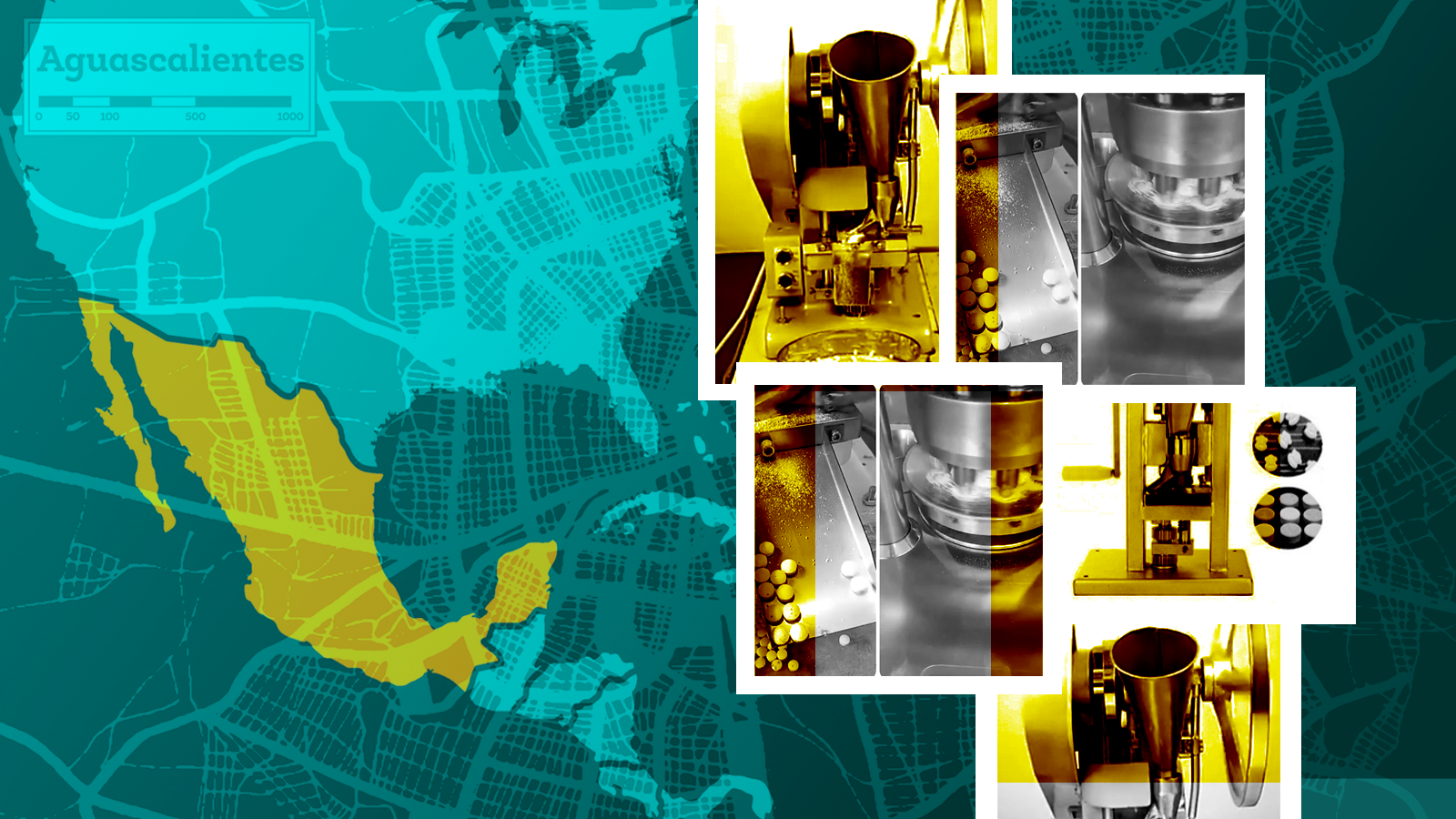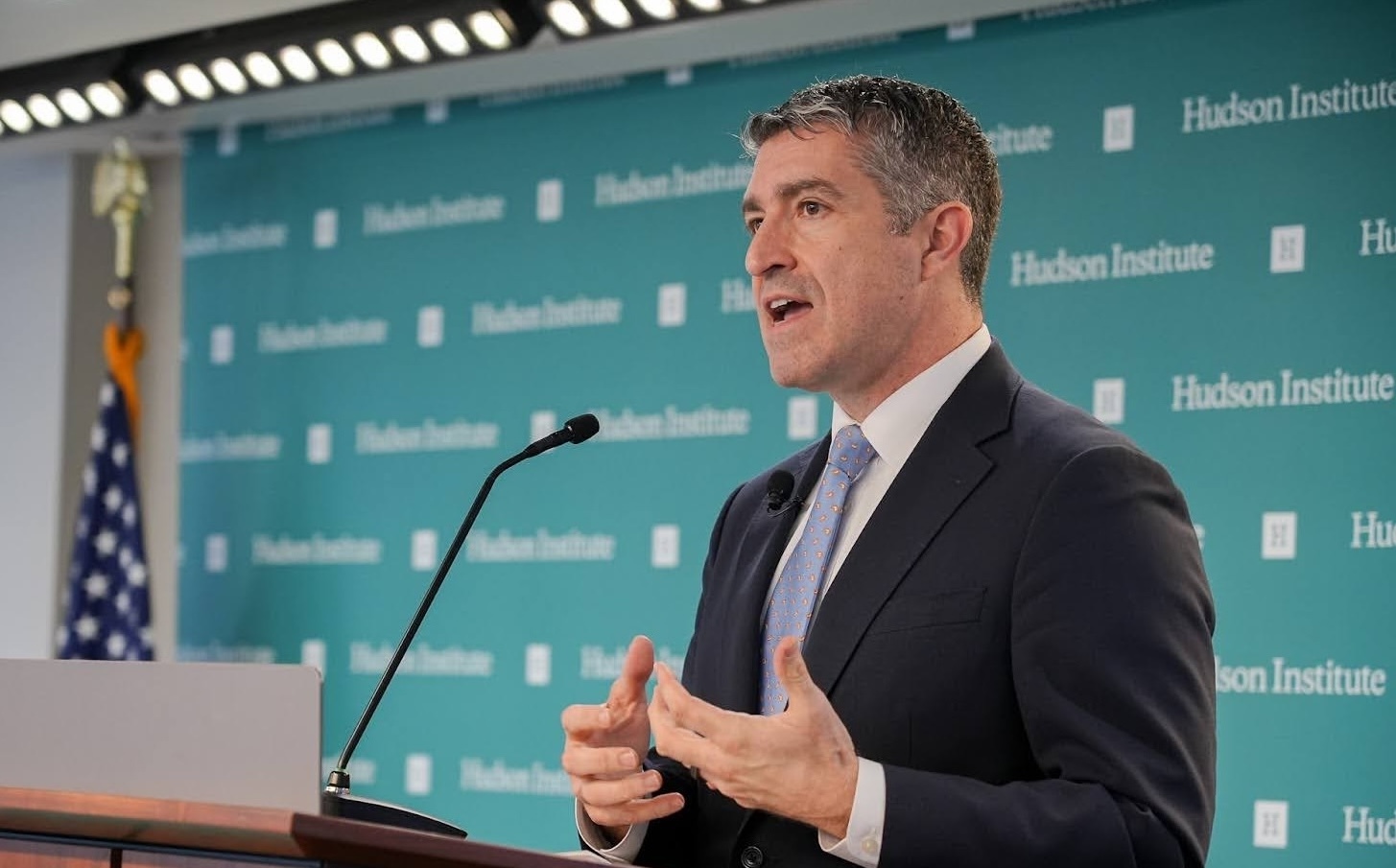As the opioid epidemic continues to claim tens of thousands of lives in the U.S. each year, government agencies are intensifying their efforts to combat the influx of fentanyl from Mexican cartels and unregulated global supply chains.
Despite these efforts, a Mexican e-commerce company is importing, advertising, and selling machinery restricted by both U.S. and Mexican governments for its role in producing illicit narcotics.
E-Commerce for Industrial Machinery Romel Sas De Cv (Romel Commerce), based in the central Mexican city of Aguascalientes, imported pharmaceutical machinery from Chinese manufacturers—one of which was later sanctioned—between March 2022 and July 2023. This machinery included tablet presses and encapsulating machines, according to a Kharon investigation.
The U.S. Drug Enforcement Administration (DEA) reported that cartels use this equipment to mold fentanyl powder into pills and to imprint markings and logos on them. With these tools, they can create pills that closely resemble legitimate prescription medications.
Both U.S. and Mexican laws require entities engaged in the purchase, possession, or sale of this equipment to report these activities to the government. The DEA also includes these items on its “Special Surveillance List” of chemicals and equipment used in illicit narcotics production. It is unclear whether Romel Commerce disclosed its purchases to the Mexican authorities.
In February of this year, the DEA issued an open letter to e-commerce companies, reiterating the legal requirement to disclose transactions involving tablet presses.
According to trade data reviewed by Kharon, Romel Commerce imported over $125,000 in equipment. One of the company’s Chinese tablet press suppliers, Jinhu Minsheng Pharmaceutical Machinery Co. Ltd., was sanctioned in 2023 by the U.S. Department of the Treasury for contributing to the proliferation of illicit drugs.
Jinhu Minsheng Pharmaceutical Machinery Co. Ltd. currently lists tablet presses for sale on the Chinese B2B e-commerce site Made-in-China. According to the Made-in-China website, Jinhu Minsheng listed North America as one of its “Main Markets.”
In 2021, Elizabeth Romero Paredes Robles, a Mexican national who wholly owns Romel Commerce also directly imported tablet presses from China in her own name.
Despite these efforts, a Mexican e-commerce company is importing, advertising, and selling machinery restricted by both U.S. and Mexican governments for its role in producing illicit narcotics.
E-Commerce for Industrial Machinery Romel Sas De Cv (Romel Commerce), based in the central Mexican city of Aguascalientes, imported pharmaceutical machinery from Chinese manufacturers—one of which was later sanctioned—between March 2022 and July 2023. This machinery included tablet presses and encapsulating machines, according to a Kharon investigation.
The U.S. Drug Enforcement Administration (DEA) reported that cartels use this equipment to mold fentanyl powder into pills and to imprint markings and logos on them. With these tools, they can create pills that closely resemble legitimate prescription medications.
Both U.S. and Mexican laws require entities engaged in the purchase, possession, or sale of this equipment to report these activities to the government. The DEA also includes these items on its “Special Surveillance List” of chemicals and equipment used in illicit narcotics production. It is unclear whether Romel Commerce disclosed its purchases to the Mexican authorities.
In February of this year, the DEA issued an open letter to e-commerce companies, reiterating the legal requirement to disclose transactions involving tablet presses.
According to trade data reviewed by Kharon, Romel Commerce imported over $125,000 in equipment. One of the company’s Chinese tablet press suppliers, Jinhu Minsheng Pharmaceutical Machinery Co. Ltd., was sanctioned in 2023 by the U.S. Department of the Treasury for contributing to the proliferation of illicit drugs.
Jinhu Minsheng Pharmaceutical Machinery Co. Ltd. currently lists tablet presses for sale on the Chinese B2B e-commerce site Made-in-China. According to the Made-in-China website, Jinhu Minsheng listed North America as one of its “Main Markets.”
In 2021, Elizabeth Romero Paredes Robles, a Mexican national who wholly owns Romel Commerce also directly imported tablet presses from China in her own name.
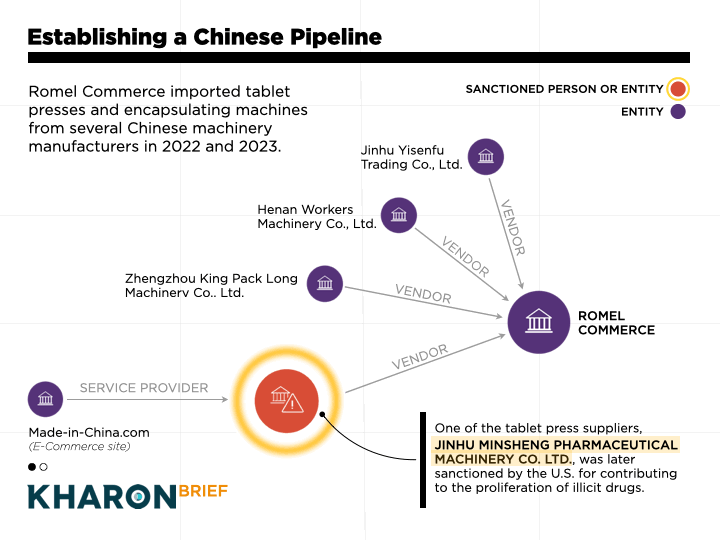
Kharon users can explore this Insight directly in the ClearView portal.
All machines were shipped from China to the port of Manzanillo, located on the west coast of Mexico, where “the Jalisco Cartel has almost-exclusive corrupt access,” according to the DEA’s 2024 National Drug Threat Assessment report. These transactions can be facilitated by Chinese e-commerce sites that host sanctioned tablet press suppliers offering international shipping, a review by Kharon found.
Once in Mexico, Romel Commerce markets the tablet presses and encapsulating machines through social media profiles. The company maintains a website and accounts on YouTube, Telegram, Facebook, and Instagram where it posts specific models of tablet presses for sale and showcases the machines in action. Their sales representatives in Mexico and Canada also have accounts across these platforms with similar content. One post in a Romel Commerce Telegram group even advertised the sale of fentanyl.
Once in Mexico, Romel Commerce markets the tablet presses and encapsulating machines through social media profiles. The company maintains a website and accounts on YouTube, Telegram, Facebook, and Instagram where it posts specific models of tablet presses for sale and showcases the machines in action. Their sales representatives in Mexico and Canada also have accounts across these platforms with similar content. One post in a Romel Commerce Telegram group even advertised the sale of fentanyl.
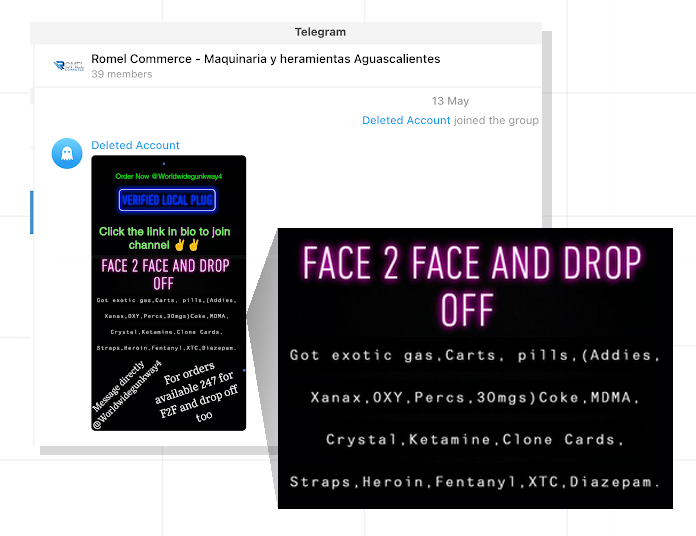
A screenshot from the Romel Commerce Telegram group advertising illegal narcotics for sale, including fentanyl.
A widespread issue
Romel Commerce’s business practices are not unique. Mexican intelligence documents leaked in 2022 to the news organization Milenio revealed that Guadalajara-based company Corporativo y Enlace Ram SA de CV was under investigation for supplying fentanyl precursor chemicals to both the Sinaloa Cartel and the Cartel de Jalisco Nueva Generacion. A Kharon review of trade data and corporate records found that Corporativo y Enlace Ram imported hundreds of thousands of dollars’ worth of fentanyl precursor chemicals and industrial machinery from China in 2023.
The company is also located at a residential address shared with two logistics companies: RRA&BE Logistica de Mexico SA de CV and Enlace Forwarding Mexico S de RL de CV, RRA&BE Logistica de Mexico SA de CV, imported metal caps from a Chinese manufacturer of punches and dies, equipment used in narcotics manufacturing that is on the Special Surveillance List.
Romel Commerce’s business practices are not unique. Mexican intelligence documents leaked in 2022 to the news organization Milenio revealed that Guadalajara-based company Corporativo y Enlace Ram SA de CV was under investigation for supplying fentanyl precursor chemicals to both the Sinaloa Cartel and the Cartel de Jalisco Nueva Generacion. A Kharon review of trade data and corporate records found that Corporativo y Enlace Ram imported hundreds of thousands of dollars’ worth of fentanyl precursor chemicals and industrial machinery from China in 2023.
The company is also located at a residential address shared with two logistics companies: RRA&BE Logistica de Mexico SA de CV and Enlace Forwarding Mexico S de RL de CV, RRA&BE Logistica de Mexico SA de CV, imported metal caps from a Chinese manufacturer of punches and dies, equipment used in narcotics manufacturing that is on the Special Surveillance List.
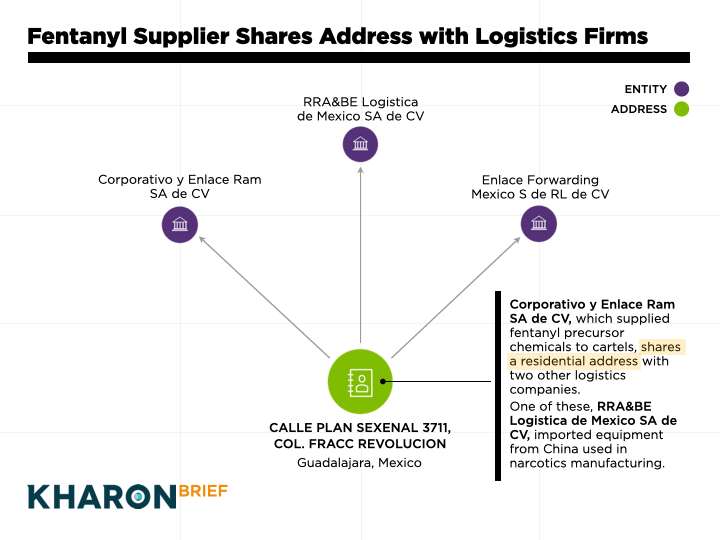
Kharon users can explore this Insight directly in the ClearView portal.
A New Player in the Fentanyl Supply Chain
India is emerging alongside China as a risky jurisdiction in the global illicit fentanyl supply chain. According to the DEA’s 2024 National Drug Threat Assessment Report, India is becoming “a major source country for [fentanyl precursor] chemicals.”
IndiaMART, a major Indian e-commerce site, also hosts suppliers of tablet presses, fentanyl precursor chemicals, and laboratory-grade glassware. A review of trade data found that these suppliers have shipped goods on the Special Surveillance List to Mexico over the past several years.
The recipients of these goods include individuals and logistics companies. In one instance, an individual in Mexico imported tableting machines from two Indian companies in 2022 and 2023; this individual shares an address with a Mexican seller of pharmaceutical machinery.
According to records reviewed by Kharon, Indian companies exporting tablet presses, glassware, and fentanyl precursor chemicals did not include the names of some of their Mexican customers on the bills of lading, possibly obscuring the end users in Mexico. One notable named customer is Sumilab, S.A. de C.V., a Mexican company that was later sanctioned by the U.S. Department of the Treasury for providing precursor chemicals to the Sinaloa Cartel.
India is emerging alongside China as a risky jurisdiction in the global illicit fentanyl supply chain. According to the DEA’s 2024 National Drug Threat Assessment Report, India is becoming “a major source country for [fentanyl precursor] chemicals.”
IndiaMART, a major Indian e-commerce site, also hosts suppliers of tablet presses, fentanyl precursor chemicals, and laboratory-grade glassware. A review of trade data found that these suppliers have shipped goods on the Special Surveillance List to Mexico over the past several years.
The recipients of these goods include individuals and logistics companies. In one instance, an individual in Mexico imported tableting machines from two Indian companies in 2022 and 2023; this individual shares an address with a Mexican seller of pharmaceutical machinery.
According to records reviewed by Kharon, Indian companies exporting tablet presses, glassware, and fentanyl precursor chemicals did not include the names of some of their Mexican customers on the bills of lading, possibly obscuring the end users in Mexico. One notable named customer is Sumilab, S.A. de C.V., a Mexican company that was later sanctioned by the U.S. Department of the Treasury for providing precursor chemicals to the Sinaloa Cartel.
US Indictments and Sanctions
In 2023, the U.S. Department of Justice indicted 35 Chinese nationals and companies for their role in supplying fentanyl precursor chemicals to Mexico. That same year, the U.S. Department of the Treasury sanctioned a vast international fentanyl procurement network that began with chemical suppliers in China and extended to cartel representatives in Mexico.
Further underscoring these concerns, the U.S. House Select Committee on Strategic Competition between the U.S. and the Chinese Communist Party released a report in 2024 highlighting China’s influence on U.S. fentanyl supply chains and convened several working groups to address this critical issue.
“Drug traffickers are killing Americans by selling fentanyl hidden in fake pills made to look like real prescription medicines. This is possible because drug traffickers are able to buy the tools they need, like pill presses and stamps, online,” said DEA Administrator Anne Milgram.
In 2023, the U.S. Department of Justice indicted 35 Chinese nationals and companies for their role in supplying fentanyl precursor chemicals to Mexico. That same year, the U.S. Department of the Treasury sanctioned a vast international fentanyl procurement network that began with chemical suppliers in China and extended to cartel representatives in Mexico.
Further underscoring these concerns, the U.S. House Select Committee on Strategic Competition between the U.S. and the Chinese Communist Party released a report in 2024 highlighting China’s influence on U.S. fentanyl supply chains and convened several working groups to address this critical issue.
“Drug traffickers are killing Americans by selling fentanyl hidden in fake pills made to look like real prescription medicines. This is possible because drug traffickers are able to buy the tools they need, like pill presses and stamps, online,” said DEA Administrator Anne Milgram.



